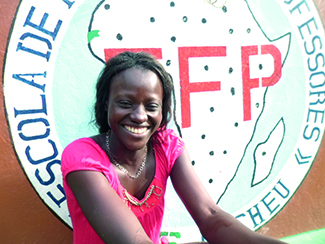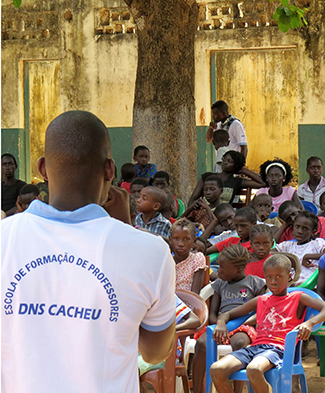consent_cookie
Duración: 1 year
Stores the user's cookie consent state
04-10-2018
Education is the fundamental pillar of societies and communities. And the cornerstone on which the development of people is based. The Universal Declaration of Human Rights, whose 70th anniversary is celebrated this year, recognizes education as a key fundamental right and enshrines the right to free and compulsory education, through inclusive and equitable access for all children.
According to the 2030 Agenda and the Sustainable Development Goal number 4, primary school enrollment in developing countries now exceeds 91%. However, 264 million children and young people do not attend school yet, according to figures from UNESCO; Many of them live in sub-Saharan Africa.
As the number of students increases in primary classrooms, the number of teachers required increases as well. This "teacher deficit" is more pronounced among vulnerable populations: girls, people with different abilities, refugees and migrants or people living in rural areas or far from large urban centers.
The UNESCO International Teachers Task Force for Education notes that in order to achieve universal primary education by 2030 it is necessary to incorporate 69 million new teachers. The key, in addition, is to strengthen an equitable, inclusive and quality educational model. It is not enough to add new teaching professionals: they must be well qualified, motivated and fully committed to this quality educational model.
39,000 teachers graduated since 1993
The training of primary school teachers - through the Teachers Training Colleges (TTC) -, professional training for young people and the education of vulnerable children are the cornerstones of the work of the Foundation and its local partners in the field of education, always under the umbrella of Humana People to People.
Since 1993, 39,000 people have graduated as primary teachers thanks to the work of the TTC At this time Humana supports 53 such centers in six African countries and in India. In total, there are 11,600 future teachers involved. The TTC are recognized by the national ministries of education and take into account in their pedagogical program the basic lines of each of them.
The teacher as a lever of development
One of the essential objectives is that teachers become levers of development of their communities, beyond their teaching work. By becoming a reference in the rural areas in which they perform their work, it is more effective, involving at the same time the parents and relatives of their students, making them participants in the importance of going to school to study.
Adelina Sambu, graduated as a teacher at the school of Cacheu, in Guinea-Bissau, tells us her experience in this regard:
"As a student of the TTC I realized that as a teacher I had to work inside and outside the classroom. When I started teaching in Canhobe, I noticed the difficulties that people in the village had to achieve enough and varied food to have a healthier diet. During my stay in Cacheu, we learned about food production, local products and agriculture. For this reason, I proposed in Canhobe to set up a school garden and an association of women farmers. In addition, we began to promote awareness actions on the importance of eating a varied diet, taking advantage of local products and the advantages of sustainable agriculture.
Those responsible for the school supported all my ideas in this regard. With this, and the collaboration of the students themselves, we managed to start up the school garden, which soon became a community garden, thanks to which the neighbors of the tabanca enjoy a healthier and more varied diet ".
This year's theme is "The right to education means the right to a qualified teacher"


